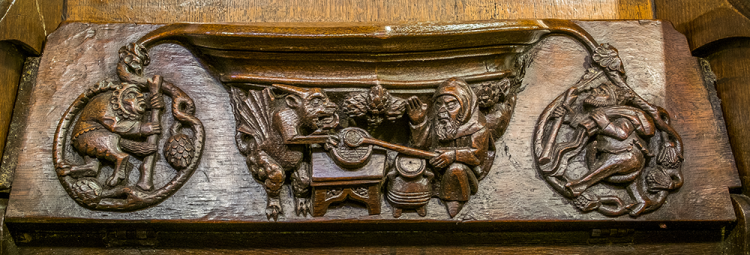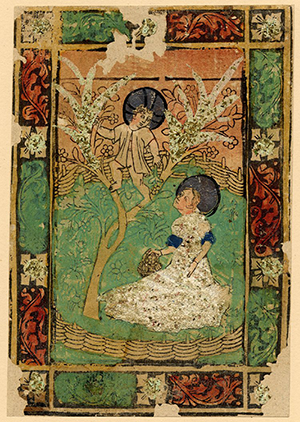
Johanna Kramer and Rabia Gregory, recipents of the NEH summer stipend
The National Endowment for the Humanities (NEH) provides summer stipends to encourage new research and publications in the humanities. It’s a highly competitive process, yet for two consecutive years, those select few have included College of Arts and Science faculty.
Johanna Kramer, an associate professor of English who specializes in medieval studies, used her 2024 stipend to research and complete her book, “Critical Wisdom: Reading ‘The Canterbury Tales’ Through Proverbs.”

A misericord illustrating a proverb from “The Canterbury Tales.” “He must have a long spoon that shall eat with the devil,” misericord; St. George’s Chapel, Windsor Castle, Windsor, U.K., dated 1477-1483 (Image Credit: ©The Dean and Canons of Windsor)

One of Gregory's favorite research materials:
St. Dorothea. hand coloured woodcut with quartz tinsel 1450-1500 1895,0122.18
© The Trustees of the British Museum. Shared under a Creative Commons Attribution-NonCommercial-ShareAlike 4.0 International (CC BY-NC-SA 4.0) licence.
While many scholars view Geoffrey Chaucer — author of "The Canterbury Tales" — as being influenced by continental European literary sources, Kramer asserts Chaucer engaged with highly diverse discourse and utilized an expansive range of literary traditions, including native English sources.
For Rabia Gregory, an associate professor of religious studies and faculty fellow for humanities undergraduate studies, a 2023 NEH stipend allowed her to continue examining the impact of affordable paper on the Christianity in medieval Western Europe.
Her search for insights extended to archives and museums across the globe — including in Austria, England, Germany, and Washington, D.C. — bringing Gregory closer to completion of her book, “Christian Pulp: Material Religion in the Age of Paper.”
The journey to a successful grant application can seem daunting. In the past five years, the NEH received an average of 792 applicants annually, awarding summer stipends to only 13 percent. However, A&S success stories like Kramer and Gregory are realized with support from the College of Arts and Science’s Office of Research and Creative Activities (ORCA).
Working closely with the Division of Research, Innovation and Impact, ORCA improves the odds through full lifecycle support of sponsored individual and team projects — from pre-award to grant closeout — as well as guidance for faculty and students across every department in the College of Arts & Science.